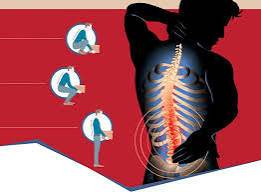Effective Strategies to Reduce Back Pain
Back pain is a common ailment that affects millions of people worldwide, impacting daily activities and overall quality of life. Whether caused by poor posture, injury, or chronic conditions, finding effective strategies to alleviate back pain is essential. Here are some proven methods to help manage and reduce back pain.
1. Maintain Proper Posture
One of the leading causes of back pain is poor posture, especially for those who spend long hours sitting at a desk. To promote better posture:
- Ergonomic Workstations: Ensure your workspace is ergonomically designed. Your chair should support your lower back, your feet should be flat on the ground, and your monitor should be at eye level.
- Mindful Sitting: When sitting, keep your back straight, shoulders relaxed, and avoid slouching. Consider using lumbar support cushions or sitting on exercise balls to encourage active sitting.
2. Regular Exercise
Exercise is crucial in preventing and alleviating back pain. Engaging in regular physical activity strengthens the muscles that support the spine. Recommended exercises include:
- Core Strengthening: Strengthening your core muscles provides stability and support for the spine. Planks, bridges, and pelvic tilts are effective exercises.
- Stretching:Incorporate stretching routines to improve flexibility and relieve tension. Focus on stretching the hamstrings, hip flexors, and lower back muscles.
- **Low-Impact Activities:** Activities such as swimming, walking, and cycling can promote overall fitness without putting excessive strain on the back.
3. Heat and Cold Therapy
Applying heat or cold can significantly reduce back pain.
- Cold Therapy: Ice packs can help reduce inflammation and numb acute pain. Apply for 15-20 minutes several times a day during the first 48 hours after an injury.
- Heat Therapy: Heat pads or warm baths can relax muscles and improve blood circulation. Use heat therapy after the initial inflammation has decreased, typically after 48 hours.
4. Mindfulness and Relaxation Techniques
Stress and tension can exacerbate back pain. Incorporating relaxation techniques can help manage pain more effectively:
- Meditation and Deep Breathing: Mindfulness practices, such as meditation and deep breathing exercises, can help reduce stress and improve your perception of pain.
- Yoga and Tai Chi: These practices combine movement, stretching, and relaxation, promoting physical and mental well-being while relieving tension in the back.
5. Weight Management
Excess weight, especially around the abdomen, can strain the back. Maintaining a healthy weight can significantly reduce the risk of back pain:
- Balanced Diet: Eating a balanced diet rich in fruits, vegetables, lean proteins, and whole grains supports overall health and weight management.
- Regular Physical Activity: Incorporating regular exercise into your routine can help maintain a healthy weight and support spinal health.
6. Over-the-Counter Medications
For acute back pain, over-the-counter (OTC) medications can provide temporary relief:
- Nonsteroidal Anti-Inflammatory Drugs (NSAIDs): Medications such as ibuprofen or naproxen can reduce pain and inflammation.
- Acetaminophen: This can also be effective for pain relief. Always consult with a healthcare provider before starting any medication regimen.
7. Physical Therapy
For persistent back pain, working with a physical therapist can be beneficial. A therapist can develop a personalized exercise program tailored to your specific needs and limitations, focusing on strengthening muscles, improving flexibility, and promoting proper movement mechanics.
8. Alternative Treatments
Some individuals find relief through alternative therapies:
- Chiropractic Care: Chiropractic adjustments can help realign the spine and alleviate discomfort.
- Acupuncture:This traditional Chinese practice may reduce back pain by stimulating specific points on the body.
- Massage Therapy: Therapeutic massage can help relieve tension and improve circulation, promoting healing in the back muscles.
Conclusion
Back pain can be debilitating, but there are numerous strategies to help manage and alleviate discomfort. By incorporating proper posture, regular exercise, heat and cold therapy, mindfulness techniques, and maintaining a healthy weight, individuals can significantly reduce their back pain. In cases of persistent pain, seeking professional guidance from a healthcare provider or physical therapist is advisable. Remember, taking proactive steps towards a healthier back can lead to a better quality of life.



No comments yet
Be the first to share your thoughts!